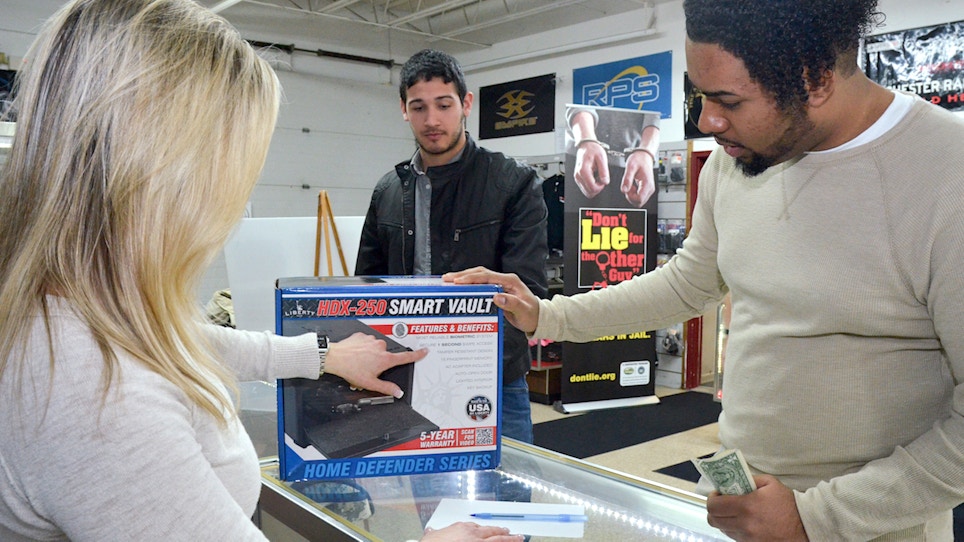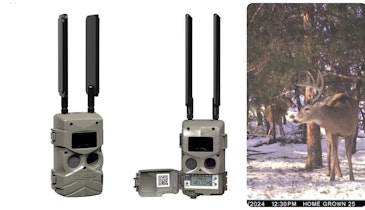
Pleasant attitudes and helpful advice goes a long way to building a relationship with customers. (Photo: NSSF)
Listening is a lost art. Retail establishments everywhere seem to have lost the ability to complete one key element when making, or attempting to make, any sale — listening to the customer.
In the perfect business environment, all any store employee needs to do is listen to what customers want and when they want it. Listening to customers in the aisles, at in-store displays and up at the cash register will help you better serve them while also helping your store become more profitable. It pays to listen.
Listen Actively
Listening and hearing what a customer says is not something that just happens. It requires a conscious effort to hear the key words and phrases, stay focused on the messages and pay attention to what is actually said. Customers provide messages in their words and in their body language.
Active listening requires patience to allow a customer to keep talking and explaining. To keep the communication flowing, smile often, keep direct eye contact and don’t check the clock or your phone. That’s a sure sign you’re not listening.
Why listen to customers? There’s an old saying that’s as true today as ever: The customer is king. Customers bring the cash and keep the business open. Your staff needs to understand that, and they need to listen to what customers have to say.
Sometimes customers need a little prodding to reveal what they are thinking. You and all in-store staff may need to set the proper groundwork to get customers talking. That means asking questions, talking about the products that interest them and pointing to examples and displays. If they bring up your reloading displays, walk over with them talk about your offerings and what they’re looking for. You might find many of your customers are looking for a specific product you’ve unwisely chosen not to carry.
“Listening to the customers is extremely important,” says Patrick Hayden, owner of Kentucky Gun Company in Bardstown, Kentucky. “You can easily identify the core products you should carry and any new products that have the customers’ interest just by listening to them. And this doesn’t always have to be done over the gun counter. We will occasionally post a new item on our Facebook page and ask our followers, ‘Would this be an item you are interested in?’”
Everyone likes to be an expert and give opinions, but to effectively listen, simply keep quiet. Encourage the customer to keep talking. That gives them more time to think, organize their thoughts and views and make important points. What a customer says can give you an overview of your store, the competition, insight into the habits of other shoppers in their category and many other important details businesses should know about their product offerings and customer base. Listen intently for key points that customers want you to know.
When something a customer says sounds confusing, be certain to ask questions for clarity. A customer, especially one who is an active shooter, new shooter, possibly a new 3-gun competitor or simply a shopper, will be glad to tell about their buying habits. Key words and phrases to listen for are: “I own___; I am looking for___; My friend bought___; I would love to shoot ___ or compete in___.” Key in on comments about specific products or product categories.
If you have doubts about something you heard, or if you just want to let the customer know you’ve been listening, simply rephrase the key words and repeat what they say. This can be critical if you wish to confirm a statement and solicit more details.
Comments Bring Profits
If you listen closely, customers can give you great business ideas.
At Kentucky Gun Company, customers kept asking about ATVs and ATV accessories, so Hayden explored his options and made space for an ATV showroom and an on-site ATV and motorcycle service center. Numerous customers next said they would buy an ATV if they only had a way to move or transport it. Hayden again listened and now stocks a line of trailers for towing and hauling ATVs. Those are prominently parked outside his business for all to see. Paying attention to customers brought more sales, along with new customers coming to the shop for more reasons. The result was higher profits.
Wondering why customers think or do things that seem odd? Listen closely and they may tell you. Customers have ways of hinting about what they like, or dislike, about your range or store and the items and services offered there.
Comments about excessive range noise, something out of reach on a top shelf, or having to hunt for an item they weren’t sure you stocked can point you toward changes that will give your customers a better experience. Not just in displays, but store layout, product options or even signage for the restroom can all be improved if you listen to customer comments. They tell you how to market to them. Listen up.
Customer comments can also help your range or store pull customers away from the competition or even reach a new customer base. If a customer makes a comment about something that happened, or that they saw or heard while in a competitor’s store or range, listen up again.
Those comments can provide key insight into your competitors. You could also learn about new items the competition may be getting in soon, something on sale or close-out at other locations, and other key marketing and sales details. This information can help you make key business decisions and possibly avoid problems your competitors are having because they stocked — or failed to stock — specific products. The same goes for services. Let your customers scout — and listen closely when they report back to you.
One phrase that should play into your future plans, “I am looking for ___.” If you don’t have something and a customer asks for it, or several customers have asked for the item or sizes, different colors, etc., you should do some quick research and make profit calculations.
This is especially true with new firearms and equipment released to the market. What are your customers seeking that you do not stock, how soon can you get it, where could you place the item(s) and what profit margin could you expect to recover?
Critical Clues
After a customer leaves, and before you forget, take a moment to take notes. It’s a good idea to write down customer names (if known), notes about goods or services they discussed and any numbers they revealed.
If you bring in an item because of this customer insight, you can call the customer to let them know the item is in stock, or call it to their attention the next time they are at your range or store.
Listening requires training, but the rewards are many. If you give customers a good experience and let them know you’re listening, they’ll come back again and again.





